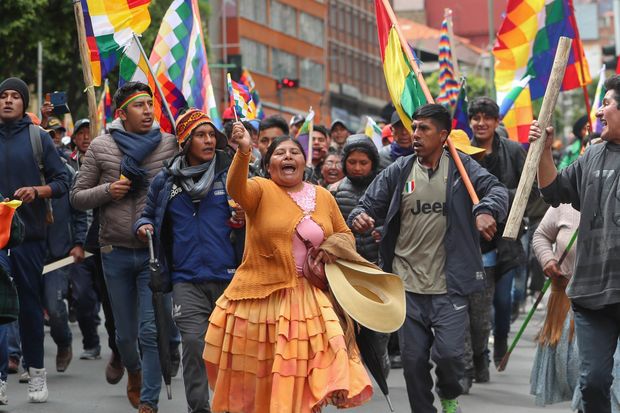
By Anna Synakh || Copy Editor
Evo Morales was first elected to be the President of Bolivia in 2005 and stepped into the position in 2006. Morales was the first president coming from the indigenous population, giving hope to the underrepresented population of the Bolivian citizens. While during his presidentship the socialist leader made advances in fighting high unemployment rates and stabilizing the economy and tripling the GDP of the nation, in the past couple of years, the Bolivian people have been disappointed with where the nation was going. The country recently moved back into deficit, and those who supported Morales before are now speaking out on him overstepping the boundaries, especially in running for the fourth term of presidency in this past election.
Based on the results Mr. Morales had won the election, Organization of American States, a continental organization that promotes democracy in the western hemisphere, claimed that Morales’s win was statistically unlikely. Morales agreed to a fresh vote, but his rivals and the chief of the armed forces made statements encouraging him to step down. Understanding that he had little support in the government, Morales resigned.
Soon after his resignation Morales sought asylum in Mexico, and in an interview revealed that he believed there was a military coup against him in Bolivia, which threatened his life.
Bolivia, similarly to the United States, has been experiencing high levels of polarization amongst its politicians. A large part of the reason Maduro was forced to leave office was his socialist beliefs. There is a fear of socialism in South America at the moment, leading the right-wing parties to become more conservative than before. The divide within the nation and frustration with the government have caused people to pour out on the streets of Bolivia and agitate for better politics.
In order to lower the frustrations Jeanine Añez, the Senate Vice President quickly filled the gaping hole left by Morales. The senator was next in line of succession, therefore her declaration of being the interim president was approved by the constitutional court of Bolivia, as well as U.S., U.K., Guatemalan, Columbian, and Brazilian governments. The Senate meeting at which Añez made her proclamation was boycotted by the Socialist Party, which holds the majority in both houses of Congress and is still backing Morales’s presidency.
Añez has made a statement declaring that fair presidential elections will be held in proper time, which is in the 90 day period after resignation, but until that time passes she will remain in power. These statements have caused a new wave of protests to arise, now calling for the return of Morales. The protests have recently turned aggressive as La Paz, the capital of Bolivia, has flooded with clashes between the military and the protesters.
On Thursday, November 14, Añez made a statement barring Morales from ever running for the presidency again.
In the past couple of weeks, the world has seen multiple protests. Chile, Bolivia, Hong Kong, and Algeria have been blowing up with revolts calling for change. Now, more than ever, it feels like the world is falling apart, but there can be positive outcomes. These protests mean that people want change and are ready to fight for it. It means that maybe the people are actually capable of standing up for what they believe in, instead of being passive about their surroundings. These events, no matter how tragic they are, are also hopeful.
Sophomore Anna Synakh is a copy editor. Her email is asynakh@fandm.edu.